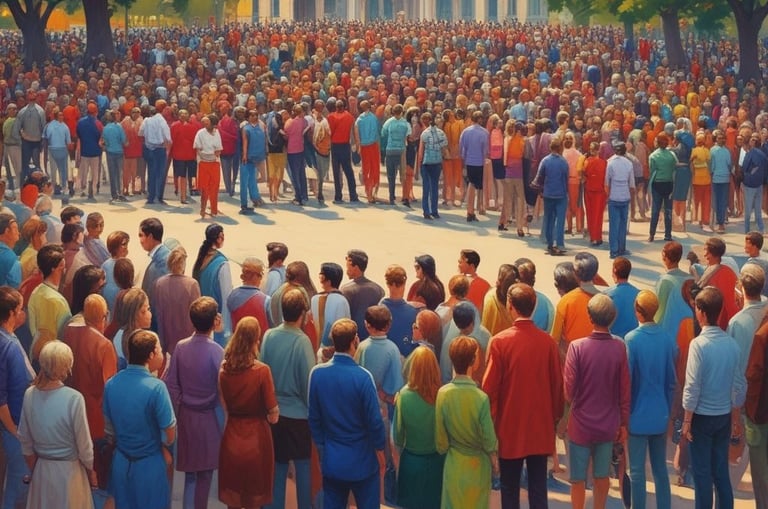The Wisdom of the Crowd: Unlocking the Power of Collective Intelligence
Discover the surprising power of collective intelligence—where diverse minds unite to solve mysteries, spark innovation, and achieve the extraordinary. Join us to explore the wisdom of the crowd!
MINDMUSE


Picture this: a contestant on the iconic game show Kaun Banega Crorepati faces a challenging question, unsure of the answer. Among their lifelines is the "Audience Poll," where hundreds of viewers offer their guesses. Time and again, the collective wisdom of the audience points to the right answer—even surpassing the accuracy of expert advice. How can a crowd of ordinary people consistently get it right?
This striking example highlights the wisdom of the crowd—the fascinating idea that the collective judgment of a group can often surpass the decisions of even the most knowledgeable expert. At first, it might seem counterintuitive. Yet, this concept reveals the remarkable potential of human collaboration when certain conditions are met. From ancient philosophy to contemporary applications, it has evolved into a cornerstone of decision-making, innovation, and problem-solving in modern society.
The roots of the wisdom of the crowd lie in the writings of Aristotle, the Greek philosopher whose insights have shaped countless aspects of human thought. In his work Politics, Aristotle observed that a diverse assembly of individuals could, through their combined perspectives, arrive at decisions superior to those of a single expert. He believed that even if each member of the group possessed only partial knowledge, their collective judgment could yield a more complete and balanced outcome.
This early notion set the stage for collective decision-making, influencing systems like democracy, where the voice of the majority is considered paramount. Aristotle’s vision underscored the importance of inclusivity and diversity—principles that remain central to the modern understanding of the wisdom of the crowd.
While Aristotle’s ideas provided the philosophical foundation, the empirical validation of collective intelligence came nearly two millennia later, through the work of Sir Francis Galton, a British scientist and statistician. In 1906, Galton attended a livestock fair where a competition invited participants to guess the weight of an ox. The participants ranged from farmers and butchers to laymen with no expertise in livestock.
When Galton analysed the nearly 800 entries, he found that while individual guesses varied widely, the average of all guesses—1,197 pounds—was astonishingly close to the ox’s actual weight of 1,198 pounds. This surprising outcome demonstrated that the collective judgment of a diverse crowd, when aggregated correctly, could be strikingly accurate.


Galton's Experiment: The Crowd's Collective Guess, Just One Pound Off.


When the Crowd Speaks, the Truth Echoes.
Public Voting: The Wisdom of the Crowd, Shaping Decisions with Collective Insight.
Galton’s findings were groundbreaking, providing tangible evidence of the potential for group intelligence to solve problems and make predictions.
The phrase "wisdom of the crowd" entered modern discourse through James Surowiecki, whose 2004 book The Wisdom of Crowds explored the mechanics of collective intelligence in depth. Surowiecki argued that under the right circumstances, groups of ordinary individuals could outperform experts in decision-making, innovation, and forecasting.
Surowiecki identified four key conditions necessary for a crowd to be “wise”:
Diversity of Opinion: Members of the group should bring different perspectives, knowledge, and approaches to the problem.
Independence: Individuals must form their judgments without being influenced by others, avoiding the pitfalls of groupthink.
Decentralization: Power and decision-making should be distributed rather than concentrated in a central authority.
Aggregation: A mechanism must exist to combine individual judgments into a single collective decision—such as voting, averaging, or market predictions.
These principles ensure that the collective intelligence of the group emerges from the interplay of diverse, independent contributions. Surowiecki illustrated this with compelling examples, from the accuracy of stock market predictions to the efficiency of crowdsourcing platforms like Wikipedia. His work not only popularized the concept but also transformed how businesses, governments, and organizations harness the power of collective decision-making.
What Makes a Crowd Wise?
For a group to exhibit collective intelligence, it must meet specific criteria:
Diversity: The group should consist of individuals with varied knowledge, skills, and experiences, which reduces the likelihood of shared biases.
Independence: Participants should think for themselves rather than conforming to dominant opinions or trends.
Decentralization: Decisions must emerge organically rather than being dictated by a single authority.
Aggregation Mechanisms: Tools like voting systems, surveys, or algorithms are essential to synthesize individual inputs into coherent outcomes.
When these conditions are satisfied, the crowd’s collective wisdom can often rival or surpass the insights of experts.
Real-World Applications of Collective Wisdom
The wisdom of the crowd is not merely a theoretical concept—it has practical applications across diverse fields:
Democracy and Governance: Elections and referendums reflect the collective judgment of citizens, shaping policies and leadership.
Market Predictions: Prediction markets, where participants bet on outcomes, often yield astonishingly accurate forecasts for events like elections or product launches.
Crowdsourcing Platforms: Websites like Wikipedia and Quora rely on the contributions of countless individuals to build vast reservoirs of knowledge.
Corporate Strategy: Companies use crowdsourcing to solve problems, develop products, and innovate, tapping into the collective intelligence of their employees or customers.
The Pros and Cons of Group Wisdom
While the wisdom of the crowd offers immense potential, it is not without its challenges.
Advantages:
Accuracy: Aggregating diverse inputs often cancels out individual errors, leading to more precise outcomes.
Cost-Effective Problem Solving: Crowdsourcing solutions can be more efficient and less expensive than relying on experts.
Diverse Insights: The variety of perspectives in a group enhances the quality of decisions.
Disadvantages:
Groupthink: When individuals conform to dominant views, the benefits of diversity and independence are lost.
Homogeneity: Lack of diversity in a group reduces its ability to generate innovative solutions.
Misinformation: Crowds can be swayed by emotional appeals or false information, particularly in digital spaces.
In today’s hyperconnected world, the wisdom of the crowd has found new avenues through technology. Platforms like social media and prediction markets enable millions to contribute their insights, collectively solving problems and forecasting outcomes. For example:
Google’s Search Algorithm relies on the collective behaviour of users to rank websites.
Kaggle Competitions bring together diverse participants to solve complex challenges.
Crowdfunding Platforms like Kickstarter pool resources from a crowd to support creative and innovative projects.
However, the digital age also amplifies the risks of misinformation, echo chambers, and herd behaviour. This underscores the importance of designing systems that maintain diversity, independence, and effective aggregation to ensure the crowd’s wisdom prevails over its potential folly.
The wisdom of the crowd is a testament to humanity’s ability to collaborate and solve problems collectively. From Aristotle’s philosophical insights to Galton’s groundbreaking experiments and Surowiecki’s modern interpretations, this idea continues to shape how we understand and harness collective intelligence.
When guided by principles of diversity, independence, and thoughtful aggregation, the collective judgment of a crowd has the power to rival—or even surpass—that of the brightest minds. As we navigate an increasingly complex world, the wisdom of the crowd offers a beacon of hope, reminding us of the untapped potential in shared human ingenuity.
